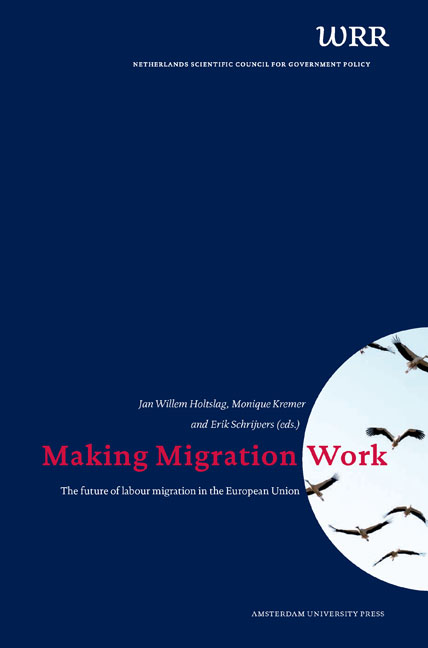Book contents
- Frontmatter
- Contents
- Introduction
- Acknowledgements
- 1 How to Make Migration Work
- 2 The Global and European Neighbourhood Migration Systems: Trends, Policy Choices, Governance Challenges and a Look Ahead
- 3 Satisfying Labour Needs in an Ageing Society
- 4 Migrant Workers: Inevitability or Policy Choice?
- 5 Intra-EU Labour Mobility after Eastern Enlargement and During the Crisis: Main Trends and Controversies
- 6 Labour Migration From Central and Eastern Europe and the Implications for Integration Policy
- About the Authors
4 - Migrant Workers: Inevitability or Policy Choice?
Published online by Cambridge University Press: 23 June 2021
- Frontmatter
- Contents
- Introduction
- Acknowledgements
- 1 How to Make Migration Work
- 2 The Global and European Neighbourhood Migration Systems: Trends, Policy Choices, Governance Challenges and a Look Ahead
- 3 Satisfying Labour Needs in an Ageing Society
- 4 Migrant Workers: Inevitability or Policy Choice?
- 5 Intra-EU Labour Mobility after Eastern Enlargement and During the Crisis: Main Trends and Controversies
- 6 Labour Migration From Central and Eastern Europe and the Implications for Integration Policy
- About the Authors
Summary
INTRODUCTION
The regulation of labour immigration is one of the most important and controversial public policy issues in high-income countries. Many states in Europe and North America have experienced rapid increases in labour immigration over the past 20 years. The current global economic downturn has added further momentum to what in many countries were already highly charged debates about the impacts of rising numbers of migrants on the economic prospects of citizens and on the host economy and society more generally. A survey by the Financial Times in March 2009 showed that over three quarters of adults in Italy and the UK, and about two thirds in Spain, Germany, and the US, supported the idea of sending migrants who cannot find a job home (Financial Times, 15 March 2009).
A central question in labour immigration policy is how to link the admission of new migrant workers to the ‘needs’ of the domestic labour market and economy more generally. What these needs are, how they vary across sectors and occupations, and how they change during periods of economic growth and crisis are highly contested. There is significant controversy about the role that migrants can, or should, play in meeting ‘skills needs’ and in reducing ‘labour and skills shortages’ in particular sectors and occupations. Employers often claim, especially but not only during times of economic growth, that there is a ‘need’ for migrants to help fill labour and skills shortages and/or to do the jobs that, they allege, domestic workers will not or cannot do. Sceptics, including some trades unions, argue that in many cases these claims simply reflect employers’ preference for recruiting cheap and exploitable migrant workers over improving wages and investing in the training and skills development of domestic workers. As unemployment rises, some argue, the economy's need for migrant workers declines. However, others point out there is a highly segmented labour market and a differentiated economy, suggesting that, even during times of economic downturn, new migrant workers are needed and in some occupations they may be critical to economic recovery (Finch et al. 2009).
The policy argument that immigration is required because of ‘skills needs’ in the domestic economy can reflect one or both of two distinct but related concerns.
- Type
- Chapter
- Information
- Making Migration WorkThe Future of Labour Migration in the European Union, pp. 69 - 82Publisher: Amsterdam University PressPrint publication year: 2013



